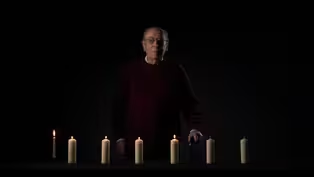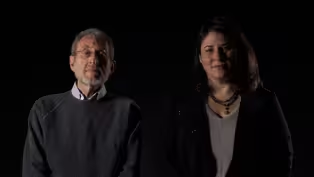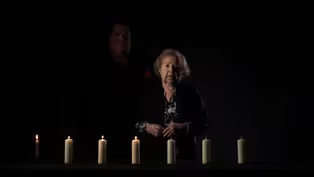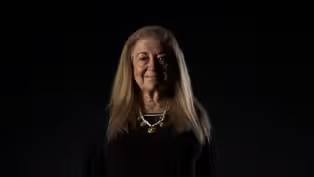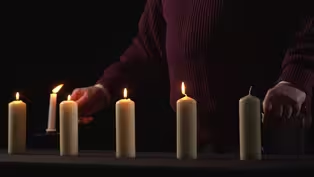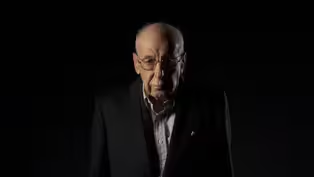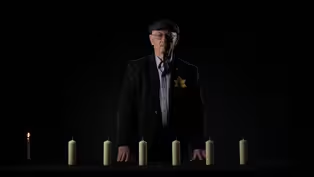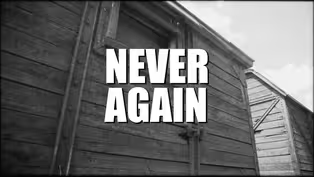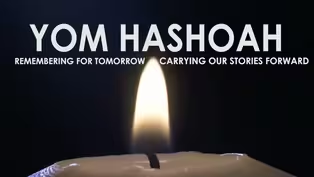
Yom HaShoah: Remembering for Tomorrow
Season 2021 Episode 1 | 32m 12sVideo has Closed Captions
Stories of Holocaust survivors interwoven with music, candle lighting and prayers.
"Yom HaShoah: Remembering for Tomorrow - Carrying Our Stories Forward" includes stories of Holocaust survivors woven throughout as well as music, candle lighting, and moving prayers. This special, creating in partnership with the Nancy & David Wolf Holocaust & Humanity Center also gives our community the chance to shine a light on the value of promoting human rights, ethics, and civic engagement.
Problems playing video? | Closed Captioning Feedback
Problems playing video? | Closed Captioning Feedback
CET Community is a local public television program presented by CET

Yom HaShoah: Remembering for Tomorrow
Season 2021 Episode 1 | 32m 12sVideo has Closed Captions
"Yom HaShoah: Remembering for Tomorrow - Carrying Our Stories Forward" includes stories of Holocaust survivors woven throughout as well as music, candle lighting, and moving prayers. This special, creating in partnership with the Nancy & David Wolf Holocaust & Humanity Center also gives our community the chance to shine a light on the value of promoting human rights, ethics, and civic engagement.
Problems playing video? | Closed Captioning Feedback
How to Watch CET Community
CET Community is available to stream on pbs.org and the free PBS App, available on iPhone, Apple TV, Android TV, Android smartphones, Amazon Fire TV, Amazon Fire Tablet, Roku, Samsung Smart TV, and Vizio.
Providing Support for PBS.org
Learn Moreabout PBS online sponsorship[music: Zog nit keyn mol] When Holocaust survivors resettled in Cincinnati, they came together in fellowship to help one another to become Americans.
They were also one of the earliest communities to take it upon themselves to honor and remember those who did not survive.
Today, we continue this tradition on Yom HaShoah, a day of Holocaust Remembrance.
I'm Sarah Weiss, CEO of the Nancy & David Wolf Holocaust & Humanity Center.
The program you are about to watch carries forward the stories of survivors and their loved ones through music, prayer, a special invocation and benediction, a pledge across our city, and a moving candle-lighting ceremony by six survivor families.
For me, this commemoration holds special meaning because of my own connection to the Holocaust.
However, my family never spoke about the horrors they experienced.
Growing up I only knew the Holocaust through silence.
Despite the loss and painful memories, my grandparents chose to go on and rebuild their lives.
What I learned from them, and many survivors, is that they did not allow these circumstances to destroy, defeat, or weaken them.
They, along with other Holocaust survivors, went on and brought forth a new generation.
And I as a grandchild of survivors am of the generation that the Nazis never wanted to exist.
And even though my grandparents remained silent, I know they wanted the memory of what was lost to live on.
And because of that, it is my obligation to bear witness, share the stories, and live a life of action and purpose.
But the descendants can't do it alone, the responsibility to remember is on all of us to carry these stories forward.
So we begin this effort with a special Invocation from Rabbi Miriam Terlinchamp of Temple Sholom.
Every Jewish person has a story about the time when they first understood the meaning of the word Holocaust.
Maybe for you it was when you first saw that room full of shoes in the Holocaust Museum, or when you first read the book Number the Stars, or the first time you noticed the dull inked numbers on your grandmother's arm.
Or maybe it was later on in life, when you were already grown and a parent, and you had to explain that Jewish people are, present tense, a persecuted people who are being killed for who we are.
The roots of Jewish identity are gnarled and scarred by our pain.
It is nearly impossible to imagine the Jewish community without persecution, and the persistent presence of that pain has kept us alert to danger, hate, and systemic violence.
And also, attuned us to the pain of other communal violence and persecution.
We get it and therefore, we MUST do something about it.
When we say the words never again we aren't just talking about what happened once upon a time; What we are saying is that our people's survival is a miracle.
And if there is any legacy that we can leave on this earth, as individuals or as a community, it is to ensure the xenophobia that led to the annihilation of our grandparents has no place in this world.
The power of our survival fuels us to be a tangible presence for justice and mercy in the wake of our generational losses.
And it is also true that even for those of us who are not part of the Jewish faith or Jewish community, that the ritual of setting aside time for mourning for those persecuted for their beliefs has meaning.
Never Again is not just a button we wear to show support.
Never Again exists beyond the confines of our own personal stories and independent identity.
Never Again requires each of us who care about the future of civilization, to bear witness to the pain wrought by silent complicity, audacious hate, and by global indifference.
Through this program we offer the action of witness not turning away from the pain of survivor testimony.
We ask ourselves to hear their stories and listen to their names with a vulnerable heart so that we may connect in grief and transform memory into bold action.
We do this every year to honor those who have died, to bear witness to the survivors, to own our history, and to commit to a future of interdependent strength.
The dream is that all of our children, not just the Jewish ones, will know the weight of our history: our wounds, our healing, our joy, our capacity for change and communal responsibility.
And they will keep and perpetuate faith and love in common humanity out of sense of resilience and hope.
We thank Rabbi Terlinchamp for her moving Invocation.
Now music: It's such a rich part of our history and in this case acts as a place setter as we reflect on what was lost.
Together we will hear Chatzi Kaddish by French composer Maurice Ravel, who, though not Jewish himself, was inspired by cantorial chant.
He gave its premiere in 1914.
This arrangement for cello and piano is by Orfeo Mandozzi, performed by Nat Chaikin on cello with piano accompaniment by Marie-France Lefebvre.
[music: Chatzi Kaddish by Maurice Ravel] What a reflective piece to set the stage for today.
Thank you, Nat and Marie.
Now, we focus together on the memory of the six million Jews men, women, and children who were systematically murdered in the heart of our civilized world.
Our remembrance is a profound form of resistance and an act of solidarity.
We resist the forces of forgetfulness.
In remembering, we keep alive within ourselves the spark of our own humanity, we rekindle the flame of human solidarity, and we affirm the light of our faith in one another.
In the Jewish tradition we light yahrzeit candles to remember and honor loved ones we've lost.
Typically, we do this on the anniversary of someone's death, but for most of the Holocaust victims, the date is unknown.
Now, we will remember the six million by having six survivor families lighting candles in memory of their loved ones.
I was born in The Hague, Netherlands.
I was very young when the war began.
My father was rounded up and deported to Mauthausen in 1942 and later sent to Auschwitz where he perished.
For the rest of us, we were made to wear yellow star badges.
I remember that I looked like every other Dutch boy, but while wearing the star, I was branded as a Jew nameless, faceless, and different.
My mother and I went into hiding, later we were discovered, arrested, and sent to the transit camp Westerbork and then Bergen Belsen, where we were saved by being part of an exchange transport to Palestine.
We came to the US in 1953.
I light this candle in honor of my father, Moritz, and the others who perished in Auschwitz.
I was born in Berlin, Germany, my family was fortunate, my brother and I were sent out of Germany in 1937.
I was in Switzerland and my brother was in England.
After Kristallnacht on November 9 & 10, 1938, my mother worked tirelessly to get us visas.
She went from consulate to consulate, finally managing to get papers from the Belgium consulate.
I was reunited with my mother and father in Belgium and then we went to London to be with my brother.
We came to the United States in 1940.
I joined the United States Army during World War II and trained at Camp Ritchie in Maryland.
My training prepared me to interrogate German Prisoners in preparation for the trials in the aftermath of the war.
I light this candle for my family members and all those who could not escape.
I was born Golda Feuerberg in Stryi, Poland and was very little when the war began.
I went into hiding with my family in an underground bunker, being so young, I had to be drugged or I might give away our location if I cried.
A little later, my parents thought it best to send me to a Polish woman who hid me in her home until she thought it was too dangerous, so she took me to a convent.
After the war, my father found me, but the nuns did not want to let me go, but he was able to sneak me out and I was reunited with my family.
We went to Palestine illegally and ended up on the island of Cyprus until we were allowed in.
I light this candle for my family that did not survive and for the children who were murdered during the Holocaust.
I was born in Poland in 1937.
When the Germans occupied Poland we escaped to Russia.
In Russia, the Russians decided that my father was a spy they sent us to Siberia.
From Siberia, we escaped to Uzbekistan.
We were in Uzbekistan until the end of the war.
At that time we went back to Poland, to our home land.
In Poland we were met by hatred, violence, and antisemitism.
We escaped to Germany.
In Germany we were in a Displaced Peoples camp.
In 1949 we emigrated to Israel where I met my husband Simon Kaltman he was a survivor.
He and his brothers and father survived Dachau and Auschwitz.
Unfortunately, his mother and two sisters did not survive.
I'm lighting this candle in honor of Simon's mother, his two sisters, my whole family, and all the people that did not survive the Holocaust.
I was born in southwestern Poland.
We fled east when the Nazis occupied our town.
We found ourselves in a territory occupied by the Russians from where they sent us to Siberia.
We survived the rest of the war in the Soviet Union by working, selling, or trading various items.
After the war, I lived in a Displaced Persons Camp in Ulm, Germany, before moving to Belgium, where I met my wife Doris who also was a survivor.
In 1951 we came to Cincinnati by plane as Doris was pregnant.
I light this candle in honor of Doris and to remember all those who were not able to flee from the Holocaust.
Melissa: My grandmother was born Sarah Waldman in Olkusz Poland, into a loving family with seven siblings.
When the Nazis occupied their town, they were forced into a ghetto.
My grandmother was deported from the ghetto and was interned in seven concentration camps.
After the war, my grandmother found her brother Sam who was the only other member of their family to survive.
Larry: My mother met my father Harry Werthaiser, who also was a survivor from Poland.
I was born in a DP camp, and we came to American in 1950.
In fact, we came to Cincinnati by train through Union Terminal.
Both: We light this candle for all the Waldmans and Werthaisers, and all the other Jews from Poland murdered during the Holocaust.
I think we can all agree how incredibly powerful those stories are and the strength it takes to share them with our audience today.
As we continue our remembrance we look to meld music and prayer with El Malei Rachamim, sung by Dr. Albert Weisbrot himself a child of survivors.
El Malei Rachamim is a prayer for the departed, it is a plea that the soul be granted menuchah nechonah (proper rest).
Both of my parents are from Poland and survived the Holocaust.
My twin sister and I were born in Bergen Belsen, after it was converted to a Displaced Persons camp after the war.
I am honored to sing the prayer in honor of my parents, and for the six million souls who died in the Holocaust.
[singing in Hebrew] Thank you, Dr. Weisbrot, for that beautiful and expressive tribute.
We're fortunate you carry on your family's legacy year after year.
The Holocaust & Humanity Center is currently celebrating its 20th anniversary.
The Center exists due to the vision of survivors and we continue to honor our promise to them.
That promise is to carry their stories forward, to help educate generations about the Holocaust, and honor the memory of those we knew, those we never met, and those who were lost during the Holocaust.
Every year we make a pledge of remembrance to carry these stories forward to never let anyone forget.
This year we've reached out to members of our community in Cincinnati to lead us in this pledge.
Hear from them now.
We dedicate this pledge to all who were murdered and to all who suffered and survived.
We vow to tell your story as well as the stories of all others who have no one else to remember them.
We promise to stand up against prejudice and injustice and to use the lessons of the Holocaust to make the world better for future generations.
We will forever keep the memories of the 6 million murdered in our hearts and never let the world forget.
It is inspiring to see a city come together around the message carried in the Pledge of Remembrance.
And to continue that message further, here now is Pastor Paul Booth from Legacy Pointe Church with a special Benediction for the occasion.
In Micah 6:8, the Old Testament prophet declares to us: The Lord has shown you what is good.
He has told you what He requires of you.
You must act with justice.
You must love to show mercy.
You must be humble as you live in the sight of your God.
As we pause to remember the 6 million souls who suffered, sacrificed, and triumphed in the face of evil of the Holocaust their lives were a testament, that they walked humbly with their God.
Let us pray.
Lord, our waymaker, our sustainer, our deliverer and our liberator, we come before You today asking that You would give us courage to stand against evil in this present age.
Lord, let this generation never forget their cries for mercy by speaking truth to power!
Lord, let this generation remember by being the light when the darkness of inequity is cast on the land.
Lord, let this generation remember the strength in which they stood in the concentration camps.
Let us remember their souls by raising our voice, lifting our hands in unity, and marching together against the principalities of anti-Semitism and hate, until we can clearly see that we are our brothers' and sisters' keeper.
In the name of our Great God, who brought us this far along the way, from atrocity to victory!
In the name of our Great God who has proven that Pharaoh would not reign, we give and declare all glory, honor, and dominion forever, Amen.
Pastor Booth, we express gratitude for your meaningful and poignant words.
As we pledge to remember the past, the sobering reality to our commemoration is that antisemitism did not end with the conclusion of World War II and the closing of the Death Camps.
While the Holocaust was the most extreme manifestation of antisemitism, it is still with us today and is a growing force of evil.
Anti-Semitic incidents are happening daily in the United States as well as all over the world.
In the face of antisemitism and other forms of hatred, we all have the capacity to be upstanders; individuals who speak out against injustice and stand up for humanity.
As we conclude this commemoration I am reminded of the words of Sam Kaltman, Holocaust survivor and past president of one of our founding organizations and what he said in his Yom HaShoah speech from 1980.
In retrospect, the Holocaust was not only a tragedy to the Jewish people, but a tragedy to the whole world.
The Holocaust manifested that the veneer of civilization is so thin and fragile that repetition is possible.
That is why today we stand to remind the world that it is our sacred mission to raise awareness and carry the stories forward for years to come.
Thank you so much for joining us.
[music: Hatikvah (Israeli National Anthem)]
Yom HaShoah: Joe Polaniecki Interview
Clip: S2021 Ep1 | 1m 2s | The Polaniecki family fled east from Poland during World War II and ended up in Siberia. (1m 2s)
Yom HaShoah: Larry Werthaiser & Melissa Hunter Interview
Clip: S2021 Ep1 | 56s | Melissa Hunter's grandmother survived seven camps. Larry Werthaiser was born in a DP camp. (56s)
Yom HaShoah: Helen Kaltman Interview
Clip: S2021 Ep1 | 1m 28s | Helen Kaltman was born in Poland and her family escaped to Russia during the war. (1m 28s)
Yom HaShoah: Zahava Rendler Interview
Clip: S2021 Ep1 | 1m 40s | Zahava was born in Poland and her family hid in an underground bunker. (1m 40s)
Yom HaShoah: Remembering for Tomorrow Broadcast Promo
Video has Closed Captions
Preview: S2021 Ep1 | 30s | Join us on April 12 at 2:30pm on CET. (30s)
Yom HaShoah: Al Miller Interview
Clip: S2021 Ep1 | 1m 18s | Al Miller tells his story and honors family members and all those who could not escape. (1m 18s)
Yom HaShoah: Henry Fenichel Interview
Clip: S2021 Ep1 | 1m 13s | Henry Fenichel tells his story and honors his father, Moritz, and the others who perished. (1m 13s)
Clip: S2021 Ep1 | 48s | Rabbi Miriam Terlinchamp on what Never Again means for the Jewish Community. (48s)
Yom HaShoah: Remembering for Tomorrow...
Preview: S2021 Ep1 | 10s | Stories of Holocaust survivors woven with music, candle lighting and more. (10s)
Providing Support for PBS.org
Learn Moreabout PBS online sponsorship

- News and Public Affairs

Top journalists deliver compelling original analysis of the hour's headlines.












Support for PBS provided by:
CET Community is a local public television program presented by CET
